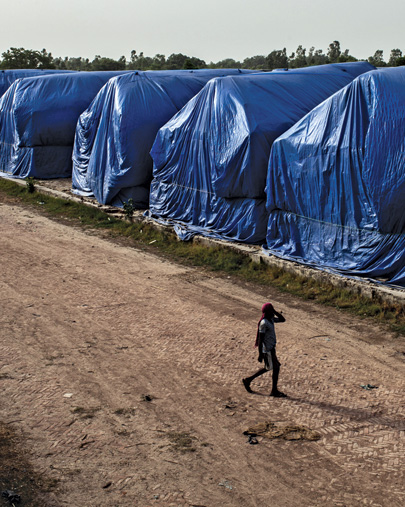|
|
By Mehul Srivastava and Andrew MacAskill on September 06, 2012
A 20-minute drive from the Indian village of Satnapur, past bone-dry fields and groups of malnourished children, there’s a government storage facility overflowing with wheat and rice. The complex is five football fields long and holds 57,000 tons of food meant for some of the nation’s 350 million families living below the poverty line of 50¢ a day. None of it is reaching the 106 households in Satnapur eligible for the rations. Ram Kishen, 52, half-blind and half-starved (above, holding his useless ration card), has gone 15 months without anything from the village’s Fair Price Shop, which is supposed to sell the food at modest rates. It hasn’t sold a lick, thanks to the biggest food heist in India’s history.

Although India’s budget for food and storage keeps growing, to a record $13 billion last year, most of the nation’s hungry aren’t being fed: About 900 million Indians eat less than the government-recommended minimums. One-fifth of adults and almost half of children younger than 5 suffer from malnourishment, in part because local food prices have spiked more than 70 percent in five years. The Food Corp. of India, a public distribution system for subsidized commodities, has been the country’s primary weapon against widespread starvation since 1965, but it has failed to distribute India’s bumper harvests to its poor. After accounting for food rot, only 41 percent of grains set aside for the underprivileged reached Indian households in 2005, according to a World Bank study commissioned by the government but withheld until last year. Within the state of Uttar Pradesh’s Sitapur district, where Kishen’s village is located, 100 percent of the food meant for the poor was stolen during a three-year period ending in 2007, according to India’s Central Bureau of Investigation. Across Uttar Pradesh, as much as $14.5 billion in food went missing during the past 10 years, according to data compiled by Bloomberg News.
The scam was simple, says Javeed Ahmad, the CBI officer leading its investigation: Often using dummy firms, local officials paid the national government the subsidized prices for the food—as little as one-tenth of the market rate—then sold it to private companies at market prices and pocketed the difference. Poor Indians seeking rations at their local Fair Price Shop would find a locked door, Ahmad says, or be told to “buzz off” and return the following month. By 2007, this was standard practice in at least 30 of Uttar Pradesh’s 71 districts, according to an affidavit filed in the high court in Allahabad, one of the biggest cities in India’s most populous state.
As with many scams involving politicians in India, no one has been punished for the food heists, despite five overlapping probes, some of which date back seven years. In addition to the perennially underfunded CBI, investigators include the federal Economic Offences Wing and several divisions of state police often beholden to corrupt lawmakers. “None of these agencies have the manpower, the willpower, or even the political support needed to investigate a theft of this size, this nature, and this breadth,” says Vishwanath Chaturvedi, a union leader who petitioned the government to examine food thefts in 2005.
|
|
Related Stories
BASF to End GM Crop Production in the European Union because of hostility from consumers. Read More
Woman Files Lawsuit Against Frito Lays for Marketing Genetically Modified Snacks as "all natural" Read more
The Increasing Importance of Organic Farming Article by The Statesman. Read more
Every year 15 million children die of hunger:
Read more
World Hunger 2011- Facts & Figures:
Read more
Look for the Non-GMO Seal when shopping:
Read more
World Food Program:
Read more
|
|







